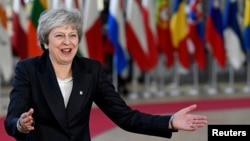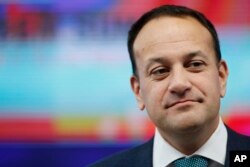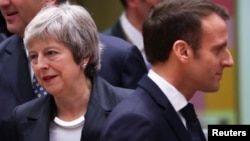British Prime Minister Theresa May is struggling to persuade European leaders to renegotiate Britain’s deal to leave the European Union.
A big majority of British MPs have said they will vote down the agreement if May doesn’t secure concessions on the so-called “Irish backstop.”
However, European allies rejected any substantial changes to the Withdrawal Agreement at a two-day summit in Brussels, which began Thursday.
May was further weakened this week after a third of her own lawmakers voted against her in a leadership challenge, prompting a pledge that she will not lead the party into the next general election.
WATCH: Rebuffed in Brussels, Wounded at Home: Brexit Turmoil Deepens for British PM
Arriving in Brussels Thursday, the prime minister said she remained optimistic over the Brexit deal.
“I don’t expect an immediate breakthrough, but what I do hope is that we can start work as quickly as possible on the assurances that are necessary,” she said.
More than assurances
It will likely take more than assurances to get the deal through the British parliament. Many MPs, including dozens from May’s own Conservative Party, object to the Irish backstop, in effect an insurance policy that will keep either Britain or Northern Ireland locked into EU rules if no trade deal is reached. Its purpose is to avoid any hard border between Northern Ireland and the Republic of Ireland for fear of reopening sectarian troubles.
Ireland’s Prime Minister Leo Varadkar refused to countenance any changes.
“We want to help this deal over the line. We’re willing to talk about explanations, clarifications, statements explaining what the deal means, but we couldn’t have anything that contradicted what’s in the Withdrawal Agreement, because that would be to reopen the Withdrawal Agreement. And the entire European Union is unequivocal that this agreement cannot be reopened,” Varadkar told reporters Thursday.
French President Emmanuel Macron echoed those words.
“I think that it’s important to avoid all ambiguity. We can’t reopen a legal agreement,” he said.
Brussels’ assurances that it will try its best to reach a trade deal are unlikely to assuage May’s critics back home.
“It has to be serious, and it has to be binding, and it has to be quite clear that the EU now has a decision to make. Not us. They do. If you want a deal, you better damn well step up to the plate,” former Conservative leader Iain Duncan Smith said Thursday. He is among the party’s MPs who voted against May in this week’s no-confidence vote.
Europe moves on
Europe has largely moved on, said analyst Grégory Claeys of the Brussels-based Bruegel policy institute.
“Brexit now is more of a British issue. It’s really important now in the British news and in British politics. On the continent, it’s not that important,” Claeys said.
May’s political future depends on getting her Brexit deal through Parliament. Dozens of her own MPs say they will vote against the deal if the Irish backstop is still in place. That vote has now been delayed until January.
Polls show momentum is building behind another referendum. Pro-EU campaigners say that with Parliament deadlocked, May’s only lifeline is to send the decision back to the people.
Meanwhile, as the clock ticks down to Brexit day, preparations are ramping up across Europe, as the likelihood grows that Britain may crash out of the EU with no deal, and just more than 100 days remaining.








